????????基于springboot的脚手架已经搭建完成的基础,即mybatis、数据库逆向工程构建好了的基础上,用Springbot+SpringSecurity来进行的用户登录认证与权限控制(认证与授权)。
目录
2.UserDetailsServiceImpl重写UserDetailsService
1.定义JwtAuthenticationTokenFilter过滤器,并把它放到spring容器中
2.将token校验过滤器配置到springsecurity的过滤器链中(springsecurity中的配置一般是在SecurityConfig中)
前言
一、 对SpringSecurity的理解
????????SpringSecurity的原理就是一个过滤器链,只要你的项目整合的了SpringSecurity,就相当于它帮你做了一系列过滤的工作,但是在实际的开发中,我们想要过滤的东西是要根据项目的需求来的,每个项目的需求都不一样,所以需要在SpringSecurity的基础上进行改进。
????????SpringSecurity的用户认证流程是通过UsernamePasswordAuthentication来做的,首先UsernamePasswordAuthentication将我们登录的信息封装成一个Authentication对象,->调用AuthenticationManager接口的authenticate()方法来进行认证,->进而再调用AbstractDetailsAuthenticationProvider接口中的DaoAuthenticationProvider()方法来进行认证,->最后调用UserDetailServer接口的loadUserByUsername()方法来进行验证,而loadUserByUsername()这个方法主要是通过内存里查询用户的信息。
????????结合下面的流程图来看实现用户认证流程

二、在项目中总体实现流程思路
在SpringSecurity原有的基础上改写登录用户认证
1.自己写一个登录的流程
这个登录首先是要在SpringConfig的白名单里的,在登录的流程里我们做以下这些事情:
?? ?① 获取AuthenticationManager 进行用户认证
? ? ? ? a 将用户登录的用户名、密码 封装成一个authentication对象
? ? ? ? b authenticationManager来进行认证
? ? ② 判断认证结果
? ? ? ? a 如果认证不通过则抛出异常
? ? ? ? b 如果认证通过 利用userid生成jwt
2.自定义一个过滤器(JwtAuthenticationTokenFilter)将其放在UsernamePasswordAuthentication之前。
而我们自定义的过滤器要进行判断请求携没携带token:
?? ?① 如果没有携带token就放行,让后面SpringSecurity的拦截器做相应的操作(如果请求在SpringConfig的白名单里,就放行,反之则拦截。)
?? ?② 如果携带token,我们就解析token,并将信息存在SecurityContextHolder中。(SecurityContextHolder是贯穿整个SpringSecurity的过滤器链的,大家都可以取到里面的信息。)
具体实现
一、引入spring security依赖(pom)
<!-- SpringbootSecurity-->
<dependency>
<groupId>org.springframework.boot</groupId>
<artifactId>spring-boot-starter-security</artifactId>
</dependency>
<!--redis依赖-->
<dependency>
<groupId>org.springframework.boot</groupId>
<artifactId>spring-boot-starter-data-redis</artifactId>
</dependency>
<!--fastjson依赖-->
<dependency>
<groupId>com.alibaba</groupId>
<artifactId>fastjson</artifactId>
<version>1.2.33</version>
</dependency>
<!--jwt依赖-->
<dependency>
<groupId>io.jsonwebtoken</groupId>
<artifactId>jjwt</artifactId>
<version>0.9.0</version>
</dependency>
<!-- 需要多加的包 -->
<dependency>
<groupId>javax.xml.bind</groupId>
<artifactId>jaxb-api</artifactId>
<version>2.3.0</version>
</dependency>
<dependency>
<groupId>com.sun.xml.bind</groupId>
<artifactId>jaxb-impl</artifactId>
<version>2.3.0</version>
</dependency>
<dependency>
<groupId>com.sun.xml.bind</groupId>
<artifactId>jaxb-core</artifactId>
<version>2.3.0</version>
</dependency>
<dependency>
<groupId>javax.activation</groupId>
<artifactId>activation</artifactId>
<version>1.1.1</version>
</dependency>二、准备工作(各种工具配置类)
各个配置类的包路径
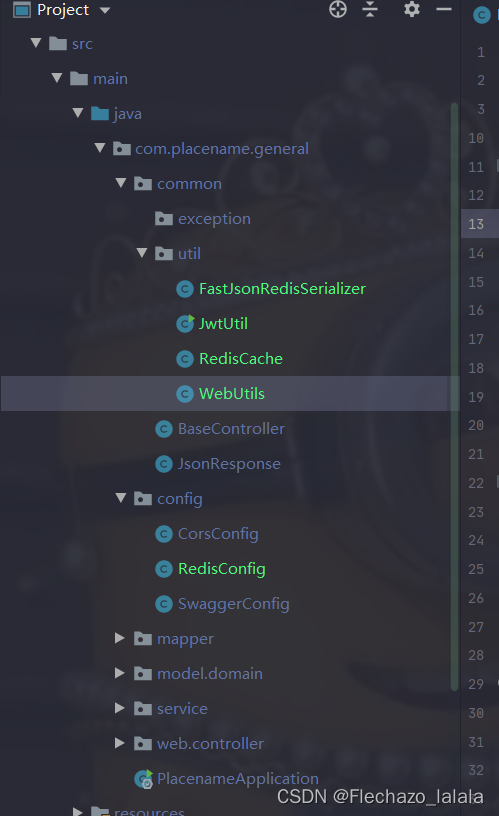
1. FastJsonRedisSerializer
import com.alibaba.fastjson.JSON;
import com.alibaba.fastjson.serializer.SerializerFeature;
import com.fasterxml.jackson.databind.JavaType;
import com.fasterxml.jackson.databind.ObjectMapper;
import com.fasterxml.jackson.databind.type.TypeFactory;
import org.springframework.data.redis.serializer.RedisSerializer;
import org.springframework.data.redis.serializer.SerializationException;
import com.alibaba.fastjson.parser.ParserConfig;
import org.springframework.util.Assert;
import java.nio.charset.Charset;
/**
* Created with IntelliJ IDEA.
*
* @ClassName RedisConfig
* @Description TODO
* @Author Flechazo_lalala
* @Date 2022-05-29 10:39
* @Version 1.0
**/
public class FastJsonRedisSerializer<T> implements RedisSerializer<T>
{
public static final Charset DEFAULT_CHARSET = Charset.forName("UTF-8");
private Class<T> clazz;
static
{
ParserConfig.getGlobalInstance().setAutoTypeSupport(true);
}
public FastJsonRedisSerializer(Class<T> clazz)
{
super();
this.clazz = clazz;
}
@Override
public byte[] serialize(T t) throws SerializationException
{
if (t == null)
{
return new byte[0];
}
return JSON.toJSONString(t, SerializerFeature.WriteClassName).getBytes(DEFAULT_CHARSET);
}
@Override
public T deserialize(byte[] bytes) throws SerializationException
{
if (bytes == null || bytes.length <= 0)
{
return null;
}
String str = new String(bytes, DEFAULT_CHARSET);
return JSON.parseObject(str, clazz);
}
protected JavaType getJavaType(Class<?> clazz)
{
return TypeFactory.defaultInstance().constructType(clazz);
}
}2. RedisConfig
import com.placename.general.common.util.FastJsonRedisSerializer;
import org.springframework.context.annotation.Bean;
import org.springframework.context.annotation.Configuration;
import org.springframework.data.redis.connection.RedisConnectionFactory;
import org.springframework.data.redis.core.RedisTemplate;
import org.springframework.data.redis.serializer.StringRedisSerializer;
/**
* Created with IntelliJ IDEA.
*
* @ClassName RedisConfig
* @Description TODO
* @Author Flechazo_lalala
* @Date 2022-05-29 10:43
* @Version 1.0
**/
@Configuration
public class RedisConfig {
@Bean
@SuppressWarnings(value = { "unchecked", "rawtypes" })
public RedisTemplate<Object, Object> redisTemplate(RedisConnectionFactory connectionFactory)
{
RedisTemplate<Object, Object> template = new RedisTemplate<>();
template.setConnectionFactory(connectionFactory);
FastJsonRedisSerializer serializer = new FastJsonRedisSerializer(Object.class);
// 使用StringRedisSerializer来序列化和反序列化redis的key值
template.setKeySerializer(new StringRedisSerializer());
template.setValueSerializer(serializer);
// Hash的key也采用StringRedisSerializer的序列化方式
template.setHashKeySerializer(new StringRedisSerializer());
template.setHashValueSerializer(serializer);
template.afterPropertiesSet();
return template;
}
}3.JWT工具类
import io.jsonwebtoken.Claims;
import io.jsonwebtoken.JwtBuilder;
import io.jsonwebtoken.Jwts;
import io.jsonwebtoken.SignatureAlgorithm;
import javax.crypto.SecretKey;
import javax.crypto.spec.SecretKeySpec;
import java.util.Base64;
import java.util.Date;
import java.util.UUID;
/**
* Created with IntelliJ IDEA.
*
* @ClassName JwtUtil
* @Description TODO
* @Author Flechazo_lalala
* @Date 2022-05-29 10:50
* @Version 1.0
**/
public class JwtUtil {
//有效期为
public static final Long JWT_TTL = 24*60 * 60 *1000L;// 60 * 60 *1000 一个小时
//设置秘钥明文
public static final String JWT_KEY = "sangeng";
public static String getUUID(){
String token = UUID.randomUUID().toString().replaceAll("-", "");
return token;
}
/**
* 生成jtw
* @param subject token中要存放的数据(json格式)
* @return
*/
public static String createJWT(String subject) {
JwtBuilder builder = getJwtBuilder(subject, null, getUUID());// 设置过期时间
return builder.compact();
}
/**
* 生成jtw
* @param subject token中要存放的数据(json格式)
* @param ttlMillis token超时时间
* @return
*/
public static String createJWT(String subject, Long ttlMillis) {
JwtBuilder builder = getJwtBuilder(subject, ttlMillis, getUUID());// 设置过期时间
return builder.compact();
}
private static JwtBuilder getJwtBuilder(String subject, Long ttlMillis, String uuid) {
SignatureAlgorithm signatureAlgorithm = SignatureAlgorithm.HS256;
SecretKey secretKey = generalKey();
long nowMillis = System.currentTimeMillis();
Date now = new Date(nowMillis);
if(ttlMillis==null){
ttlMillis=JwtUtil.JWT_TTL;
}
long expMillis = nowMillis + ttlMillis;
Date expDate = new Date(expMillis);
return Jwts.builder()
.setId(uuid) //唯一的ID
.setSubject(subject) // 主题 可以是JSON数据
.setIssuer("sg") // 签发者
.setIssuedAt(now) // 签发时间
.signWith(signatureAlgorithm, secretKey) //使用HS256对称加密算法签名, 第二个参数为秘钥
.setExpiration(expDate);
}
/**
* 创建token
* @param id
* @param subject
* @param ttlMillis
* @return
*/
public static String createJWT(String id, String subject, Long ttlMillis) {
JwtBuilder builder = getJwtBuilder(subject, ttlMillis, id);// 设置过期时间
return builder.compact();
}
public static void main(String[] args) throws Exception {
String token = "eyJhbGciOiJIUzI1NiJ9.eyJqdGkiOiJjYWM2ZDVhZi1mNjVlLTQ0MDAtYjcxMi0zYWEwOGIyOTIwYjQiLCJzdWIiOiJzZyIsImlzcyI6InNnIiwiaWF0IjoxNjM4MTA2NzEyLCJleHAiOjE2MzgxMTAzMTJ9.JVsSbkP94wuczb4QryQbAke3ysBDIL5ou8fWsbt_ebg";
Claims claims = parseJWT(token);
System.out.println(claims);
}
/**
* 生成加密后的秘钥 secretKey
* @return
*/
public static SecretKey generalKey() {
byte[] encodedKey = Base64.getDecoder().decode(JwtUtil.JWT_KEY);
SecretKey key = new SecretKeySpec(encodedKey, 0, encodedKey.length, "AES");
return key;
}
/**
* 解析
*
* @param jwt
* @return
* @throws Exception
*/
public static Claims parseJWT(String jwt) throws Exception {
SecretKey secretKey = generalKey();
return Jwts.parser()
.setSigningKey(secretKey)
.parseClaimsJws(jwt)
.getBody();
}
}4.RedisCache
import org.springframework.beans.factory.annotation.Autowired;
import org.springframework.data.redis.core.BoundSetOperations;
import org.springframework.data.redis.core.HashOperations;
import org.springframework.data.redis.core.RedisTemplate;
import org.springframework.data.redis.core.ValueOperations;
import org.springframework.stereotype.Component;
import java.util.*;
import java.util.concurrent.TimeUnit;
/**
* Created with IntelliJ IDEA.
*
* @ClassName RedisCache
* @Description TODO
* @Author Flechazo_lalala
* @Date 2022-05-29 10:53
* @Version 1.0
**/
@Component
public class RedisCache
{
@Autowired
public RedisTemplate redisTemplate;
/**
* 缓存基本的对象,Integer、String、实体类等
*
* @param key 缓存的键值
* @param value 缓存的值
*/
public <T> void setCacheObject(final String key, final T value)
{
redisTemplate.opsForValue().set(key, value);
}
/**
* 缓存基本的对象,Integer、String、实体类等
*
* @param key 缓存的键值
* @param value 缓存的值
* @param timeout 时间
* @param timeUnit 时间颗粒度
*/
public <T> void setCacheObject(final String key, final T value, final Integer timeout, final TimeUnit timeUnit)
{
redisTemplate.opsForValue().set(key, value, timeout, timeUnit);
}
/**
* 设置有效时间
*
* @param key Redis键
* @param timeout 超时时间
* @return true=设置成功;false=设置失败
*/
public boolean expire(final String key, final long timeout)
{
return expire(key, timeout, TimeUnit.SECONDS);
}
/**
* 设置有效时间
*
* @param key Redis键
* @param timeout 超时时间
* @param unit 时间单位
* @return true=设置成功;false=设置失败
*/
public boolean expire(final String key, final long timeout, final TimeUnit unit)
{
return redisTemplate.expire(key, timeout, unit);
}
/**
* 获得缓存的基本对象。
*
* @param key 缓存键值
* @return 缓存键值对应的数据
*/
public <T> T getCacheObject(final String key)
{
ValueOperations<String, T> operation = redisTemplate.opsForValue();
return operation.get(key);
}
/**
* 删除单个对象
*
* @param key
*/
public boolean deleteObject(final String key)
{
return redisTemplate.delete(key);
}
/**
* 删除集合对象
*
* @param collection 多个对象
* @return
*/
public long deleteObject(final Collection collection)
{
return redisTemplate.delete(collection);
}
/**
* 缓存List数据
*
* @param key 缓存的键值
* @param dataList 待缓存的List数据
* @return 缓存的对象
*/
public <T> long setCacheList(final String key, final List<T> dataList)
{
Long count = redisTemplate.opsForList().rightPushAll(key, dataList);
return count == null ? 0 : count;
}
/**
* 获得缓存的list对象
*
* @param key 缓存的键值
* @return 缓存键值对应的数据
*/
public <T> List<T> getCacheList(final String key)
{
return redisTemplate.opsForList().range(key, 0, -1);
}
/**
* 缓存Set
*
* @param key 缓存键值
* @param dataSet 缓存的数据
* @return 缓存数据的对象
*/
public <T> BoundSetOperations<String, T> setCacheSet(final String key, final Set<T> dataSet)
{
BoundSetOperations<String, T> setOperation = redisTemplate.boundSetOps(key);
Iterator<T> it = dataSet.iterator();
while (it.hasNext())
{
setOperation.add(it.next());
}
return setOperation;
}
/**
* 获得缓存的set
*
* @param key
* @return
*/
public <T> Set<T> getCacheSet(final String key)
{
return redisTemplate.opsForSet().members(key);
}
/**
* 缓存Map
*
* @param key
* @param dataMap
*/
public <T> void setCacheMap(final String key, final Map<String, T> dataMap)
{
if (dataMap != null) {
redisTemplate.opsForHash().putAll(key, dataMap);
}
}
/**
* 获得缓存的Map
*
* @param key
* @return
*/
public <T> Map<String, T> getCacheMap(final String key)
{
return redisTemplate.opsForHash().entries(key);
}
/**
* 往Hash中存入数据
*
* @param key Redis键
* @param hKey Hash键
* @param value 值
*/
public <T> void setCacheMapValue(final String key, final String hKey, final T value)
{
redisTemplate.opsForHash().put(key, hKey, value);
}
/**
* 获取Hash中的数据
*
* @param key Redis键
* @param hKey Hash键
* @return Hash中的对象
*/
public <T> T getCacheMapValue(final String key, final String hKey)
{
HashOperations<String, String, T> opsForHash = redisTemplate.opsForHash();
return opsForHash.get(key, hKey);
}
/**
* 删除Hash中的数据
*
* @param key
* @param hkey
*/
public void delCacheMapValue(final String key, final String hkey)
{
HashOperations hashOperations = redisTemplate.opsForHash();
hashOperations.delete(key, hkey);
}
/**
* 获取多个Hash中的数据
*
* @param key Redis键
* @param hKeys Hash键集合
* @return Hash对象集合
*/
public <T> List<T> getMultiCacheMapValue(final String key, final Collection<Object> hKeys)
{
return redisTemplate.opsForHash().multiGet(key, hKeys);
}
/**
* 获得缓存的基本对象列表
*
* @param pattern 字符串前缀
* @return 对象列表
*/
public Collection<String> keys(final String pattern)
{
return redisTemplate.keys(pattern);
}
}5.WebUtils
import org.springframework.web.context.request.RequestContextHolder;
import javax.servlet.ServletContext;
import javax.servlet.http.HttpServletResponse;
import java.io.IOException;
import java.io.UnsupportedEncodingException;
import java.net.URLEncoder;
/**
* Created with IntelliJ IDEA.
*
* @ClassName WebUtils
* @Description TODO
* @Author Flechazo_lalala
* @Date 2022-05-29 10:57
* @Version 1.0
**/
public class WebUtils
{
/**
* 将字符串渲染到客户端
*
* @param response 渲染对象
* @param string 待渲染的字符串
* @return null
*/
public static void renderString(HttpServletResponse response, String string) {
try
{
response.setStatus(200);
response.setContentType("application/json");
response.setCharacterEncoding("utf-8");
response.getWriter().print(string);
}
catch (IOException e)
{
e.printStackTrace();
}
}
public static void setDownLoadHeader(String filename, ServletContext context, HttpServletResponse response) throws UnsupportedEncodingException {
String mimeType = context.getMimeType(filename);//获取文件的mime类型
response.setHeader("content-type",mimeType);
String fname= URLEncoder.encode(filename,"UTF-8");
response.setHeader("Content-disposition","attachment; filename="+fname);
// response.setContentType("application/vnd.openxmlformats-officedocument.spreadsheetml.sheet");
// response.setCharacterEncoding("utf-8");
}
}三、UserDetailsService的实现类
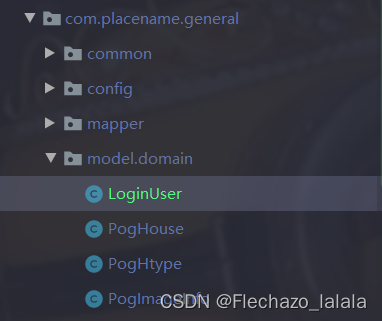
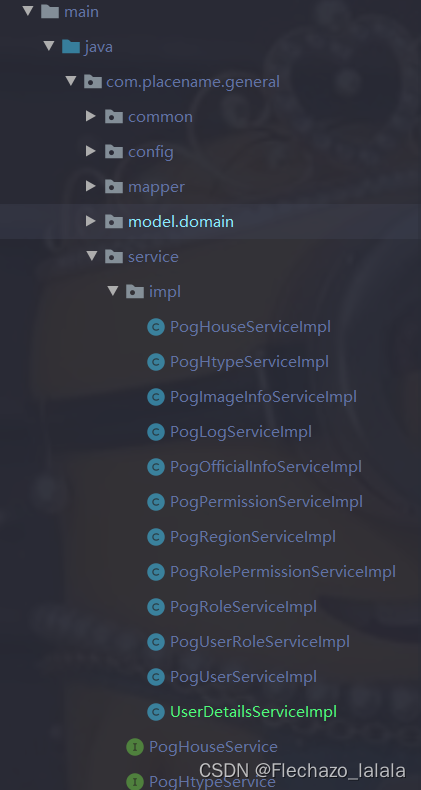
1.LoginUser重写UserDetail
import lombok.AllArgsConstructor;
import lombok.Data;
import lombok.NoArgsConstructor;
import org.springframework.security.core.GrantedAuthority;
import org.springframework.security.core.userdetails.UserDetails;
import java.util.Collection;
/**
* Created with IntelliJ IDEA.
*
* @ClassName LoginUser
* @Description TODO
* @Author Flechazo_lalala
* @Date 2022-05-29 11:44
* @Version 1.0
**/
@Data
@NoArgsConstructor
@AllArgsConstructor
public class LoginUser implements UserDetails {
// 自己封装用户的信息
private PogUser pogUser;
// 获取权限信息
@Override
public Collection<? extends GrantedAuthority> getAuthorities() {
return null;
}
// 返回用户的密码
@Override
public String getPassword() {
return pogUser.getPassword();
}
// 返回用户名
@Override
public String getUsername() {
return pogUser.getPassword();
}
// 判断是否没有过期, 改为true
@Override
public boolean isAccountNonExpired() {
return true;
}
//改为true
@Override
public boolean isAccountNonLocked() {
return true;
}
//改为true
@Override
public boolean isCredentialsNonExpired() {
return true;
}
//改为true
@Override
public boolean isEnabled() {
return true;
}
}2.UserDetailsServiceImpl重写UserDetailsService
import com.baomidou.mybatisplus.core.conditions.query.LambdaQueryWrapper;
import com.placename.general.mapper.PogUserMapper;
import com.placename.general.model.domain.LoginUser;
import com.placename.general.model.domain.PogUser;
import org.springframework.beans.factory.annotation.Autowired;
import org.springframework.security.core.userdetails.UserDetails;
import org.springframework.security.core.userdetails.UserDetailsService;
import org.springframework.security.core.userdetails.UsernameNotFoundException;
import org.springframework.stereotype.Service;
import java.util.Objects;
/**
* Created with IntelliJ IDEA.
*
* @ClassName UserDetailsServiceImpl
* @Description TODO
* @Author Flechazo_lalala
* @Date 2022-05-29 11:20
* @Version 1.0
**/
@Service
public class UserDetailsServiceImpl implements UserDetailsService{
@Autowired
private PogUserMapper pogUserMapper;
@Override
public UserDetails loadUserByUsername(String username) throws UsernameNotFoundException {
// 根据用户名查询用户信息
LambdaQueryWrapper<PogUser> queryWrapper = new LambdaQueryWrapper<>();
queryWrapper.eq(PogUser::getUsername, username);
PogUser pogUser = pogUserMapper.selectOne(queryWrapper);
if(Objects.isNull(pogUser)){
throw new RuntimeException("用户不存在");
}
// PogUser pogUser = pogUserMapper.selectByUserNanme(username);
// System.out.println(pogUser);
// if(Objects.isNull(pogUser)){
// throw new RuntimeException("用户不存在");
// }
//TODO 查询对应的权限信息
return new LoginUser(pogUser);
}
}四、密码加密存储SecurityConfig
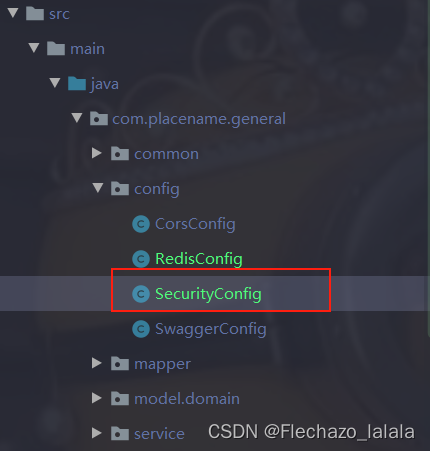
import org.springframework.context.annotation.Bean;
import org.springframework.context.annotation.Configuration;
import org.springframework.security.config.annotation.web.configuration.WebSecurityConfigurerAdapter;
import org.springframework.security.crypto.bcrypt.BCryptPasswordEncoder;
import org.springframework.security.crypto.password.PasswordEncoder;
/**
* Created with IntelliJ IDEA.
*
* @ClassName SecurityConfig
* @Description TODO
* @Author Flechazo_lalala
* @Date 2022-05-29 14:13
* @Version 1.0
**/
@Configuration
public class SecurityConfig extends WebSecurityConfigurerAdapter {
@Bean
public PasswordEncoder passwordEncoder(){
return new BCryptPasswordEncoder();
}
}五、逻辑代码的编写
1.配置类SecurityConfig
// 在刚刚密码加密存储的SecurityConfig里添加新的信息
import org.springframework.context.annotation.Bean;
import org.springframework.context.annotation.Configuration;
import org.springframework.security.authentication.AuthenticationManager;
import org.springframework.security.config.annotation.web.builders.HttpSecurity;
import org.springframework.security.config.annotation.web.configuration.WebSecurityConfigurerAdapter;
import org.springframework.security.config.http.SessionCreationPolicy;
import org.springframework.security.crypto.bcrypt.BCryptPasswordEncoder;
import org.springframework.security.crypto.password.PasswordEncoder;
/**
* Created with IntelliJ IDEA.
*
* @ClassName SecurityConfig
* @Description TODO
* @Author Flechazo_lalala
* @Date 2022-05-29 14:13
* @Version 1.0
**/
@Configuration
public class SecurityConfig extends WebSecurityConfigurerAdapter {
@Bean
public PasswordEncoder passwordEncoder(){
return new BCryptPasswordEncoder();
}
@Override
protected void configure(HttpSecurity http) throws Exception {
http
//关闭csrf
.csrf().disable()
//不通过Session获取SecurityContext
.sessionManagement().sessionCreationPolicy(SessionCreationPolicy.STATELESS)
.and()
.authorizeRequests()
// 对于登录接口 允许匿名访问
.antMatchers("/login").anonymous()
// 除上面外的所有请求全部需要认证即可访问
.anyRequest().authenticated();
}
@Override
@Bean
public AuthenticationManager authenticationManagerBean() throws Exception {
return super.authenticationManagerBean();
}
}
2.封装返回的用户信息UserVo
import com.placename.general.model.domain.PogUser;
import lombok.AllArgsConstructor;
import lombok.Data;
import lombok.NoArgsConstructor;
/**
* Created with IntelliJ IDEA.
*
* @ClassName UserVo
* @Description TODO
* @Author Flechazo_lalala
* @Date 2022-05-29 15:40
* @Version 1.0
**/
@Data
@NoArgsConstructor
@AllArgsConstructor
public class UserVo {
private String token;
private PogUser pogUser;
}3.编写用户登录Controller层
import com.placename.general.common.JsonResponse;
import com.placename.general.model.domain.PogUser;
import com.placename.general.service.PogUserService;
import io.swagger.annotations.Api;
import org.springframework.beans.factory.annotation.Autowired;
import org.springframework.web.bind.annotation.*;
/**
* Created with IntelliJ IDEA.
*
* @ClassName LoginController
* @Description TODO
* @Author Flechazo_lalala
* @Date 2022-05-29 14:58
* @Version 1.0
**/
@RestController
@Api(tags = "用户管理")
@RequestMapping("/api/user")
public class LoginController {
@Autowired
private PogUserService pogUserService;
@PostMapping("/login")
public JsonResponse login(@RequestBody PogUser pogUser){
return JsonResponse.success(pogUserService.login(pogUser));
}
}
4.编写用户登录接口Service层
import com.placename.general.model.domain.PogUser;
import com.baomidou.mybatisplus.extension.service.IService;
import com.placename.general.model.vo.UserVo;
/**
* <p>
* 服务类
* </p>
*
* @author Flechazo_lalala
* @since 2022-05-27
*/
public interface PogUserService extends IService<PogUser> {
UserVo login(PogUser pogUser);
}5.编写Service实现类
import com.placename.general.common.util.JwtUtil;
import com.placename.general.model.domain.LoginUser;
import com.placename.general.model.domain.PogUser;
import com.placename.general.mapper.PogUserMapper;
import com.placename.general.model.vo.UserVo;
import com.placename.general.service.PogUserService;
import com.baomidou.mybatisplus.extension.service.impl.ServiceImpl;
import org.springframework.beans.factory.annotation.Autowired;
import org.springframework.security.authentication.AuthenticationManager;
import org.springframework.security.authentication.UsernamePasswordAuthenticationToken;
import org.springframework.security.core.Authentication;
import org.springframework.security.crypto.password.PasswordEncoder;
import org.springframework.stereotype.Service;
import java.time.LocalDateTime;
import java.util.Objects;
/**
* <p>
* 服务实现类
* </p>
*
* @author Flechazo_lalala
* @since 2022-05-27
*/
@Service
public class PogUserServiceImpl extends ServiceImpl<PogUserMapper, PogUser> implements PogUserService {
@Autowired
private PogUserMapper pogUserMapper;
@Autowired
private PasswordEncoder passwordEncoder;
@Autowired
private AuthenticationManager authenticationManager;
@Autowired
private RedisCache redisCache;
@Override
public UserVo login(PogUser pogUser) {
// 获取AuthenticationManager 进行用户认证
// 1.将用户登录的用户名、密码 封装成一个authentication对象
UsernamePasswordAuthenticationToken authenticationToken = new
UsernamePasswordAuthenticationToken(pogUser.getUsername(), pogUser.getPassword());
// 2.authenticationManager来进行认证,
Authentication authentication = authenticationManager.authenticate(authenticationToken);
// 判断认证结果
// 1.如果认证不通过则抛出异常;
if(Objects.isNull(authentication)){
throw new RuntimeException("登录失败");
}
// 2.如果认证通过 利用userid生成应该jwt
LoginUser loginUser = (LoginUser) authentication.getPrincipal();
String userid = loginUser.getPogUser().getId().toString();
String jwt = JwtUtil.createJWT(userid);
// 把完整的用户信息存入redis中
redisCache.setCacheObject("bloglogin:"+userId,loginUser);
UserVo userVo = new UserVo(jwt, pogUser);
return userVo;
}
}
六、登录校验过滤器
1.定义JwtAuthenticationTokenFilter过滤器,并把它放到spring容器中
import com.alibaba.fastjson.JSON;
import com.placename.general.common.util.JwtUtil;
import com.placename.general.common.util.RedisCache;
import com.placename.general.common.util.WebUtils;
import com.placename.general.model.domain.LoginUser;
import io.jsonwebtoken.Claims;
import org.springframework.beans.factory.annotation.Autowired;
import org.springframework.security.authentication.UsernamePasswordAuthenticationToken;
import org.springframework.security.core.context.SecurityContextHolder;
import org.springframework.stereotype.Component;
import org.springframework.util.StringUtils;
import org.springframework.web.filter.OncePerRequestFilter;
import javax.servlet.FilterChain;
import javax.servlet.ServletException;
import javax.servlet.http.HttpServletRequest;
import javax.servlet.http.HttpServletResponse;
import java.io.IOException;
import java.util.Objects;
/**
* Created with IntelliJ IDEA.
*
* @ClassName JwtAuthenticationTokenFilter
* @Description TODO
* @Author Flechazo_lalala
* @Date 2022-05-30 9:02
* @Version 1.0
**/
@Component
public class JwtAuthenticationTokenFilter extends OncePerRequestFilter {
@Autowired
private RedisCache redisCache;
@Override
protected void doFilterInternal(HttpServletRequest request, HttpServletResponse response, FilterChain filterChain) throws ServletException, IOException {
// 获取token
String token = request.getHeader("token");
// 1.如果没有获取到token,直接放行,后面会有拦截器拦截它的, 即表明用户未登录过
if(!StringUtils.hasText(token)){
filterChain.doFilter(request, response);
return;
}
// 2. 如果获取到token后才进行以下操作,即表明已经登录过了
// 2.1 解析token
Claims claims = null;
try {
claims = JwtUtil.parseJWT(token);
} catch (Exception e) {
e.printStackTrace();
//token超时 token非法
//响应告诉前端需要重新登录
throw new RuntimeException("token非法");
}
// 2.2根据token解析的用户id去redis中获取用户信息 TODO
String userId = claims.getSubject();
LoginUser loginUser = redisCache.getCacheObject("bloglogin:" + userId);
// 2.2.1 如果获取不到,说明登录过期 提示重新登录
if(Objects.isNull(loginUser)){
throw new RuntimeException("用户登录过期");
}
//2.2.2 存入SecurityContextHolder
// TODO 获取权限信息封装到 authenticationToken
UsernamePasswordAuthenticationToken authenticationToken =
new UsernamePasswordAuthenticationToken(loginUser,null,null);
SecurityContextHolder.getContext().setAuthentication(authenticationToken);
// token存在且解析完了,则放行
filterChain.doFilter(request, response);
}
}
2.将token校验过滤器配置到springsecurity的过滤器链中(springsecurity中的配置一般是在SecurityConfig中)
import com.placename.general.common.filter.JwtAuthenticationTokenFilter;
import org.springframework.beans.factory.annotation.Autowired;
import org.springframework.context.annotation.Bean;
import org.springframework.context.annotation.Configuration;
import org.springframework.security.authentication.AuthenticationManager;
import org.springframework.security.config.annotation.web.builders.HttpSecurity;
import org.springframework.security.config.annotation.web.configuration.WebSecurityConfigurerAdapter;
import org.springframework.security.config.http.SessionCreationPolicy;
import org.springframework.security.crypto.bcrypt.BCryptPasswordEncoder;
import org.springframework.security.crypto.password.PasswordEncoder;
import org.springframework.security.web.authentication.UsernamePasswordAuthenticationFilter;
/**
* Created with IntelliJ IDEA.
*
* @ClassName SecurityConfig
* @Description TODO
* @Author Flechazo_lalala
* @Date 2022-05-29 14:13
* @Version 1.0
**/
@Configuration
public class SecurityConfig extends WebSecurityConfigurerAdapter {
@Bean
public PasswordEncoder passwordEncoder(){
return new BCryptPasswordEncoder();
}
@Autowired
private JwtAuthenticationTokenFilter jwtAuthenticationTokenFilter;
@Override
protected void configure(HttpSecurity http) throws Exception {
http
//关闭csrf
.csrf().disable()
//不通过Session获取SecurityContext
.sessionManagement().sessionCreationPolicy(SessionCreationPolicy.STATELESS)
.and()
.authorizeRequests()
// 对于登录接口 允许匿名访问
.antMatchers("/login").anonymous()
// 除上面外的所有请求全部需要认证即可访问
.anyRequest().authenticated();
//把jwtAuthenticationTokenFilter添加到SpringSecurity的过滤器链中
// 将jwtAuthenticationTokenFilter放在UsernamePasswordAuthenticationFilter之前
http.addFilterBefore(jwtAuthenticationTokenFilter, UsernamePasswordAuthenticationFilter.class);
}
@Override
@Bean
public AuthenticationManager authenticationManagerBean() throws Exception {
return super.authenticationManagerBean();
}
}八、最后测试
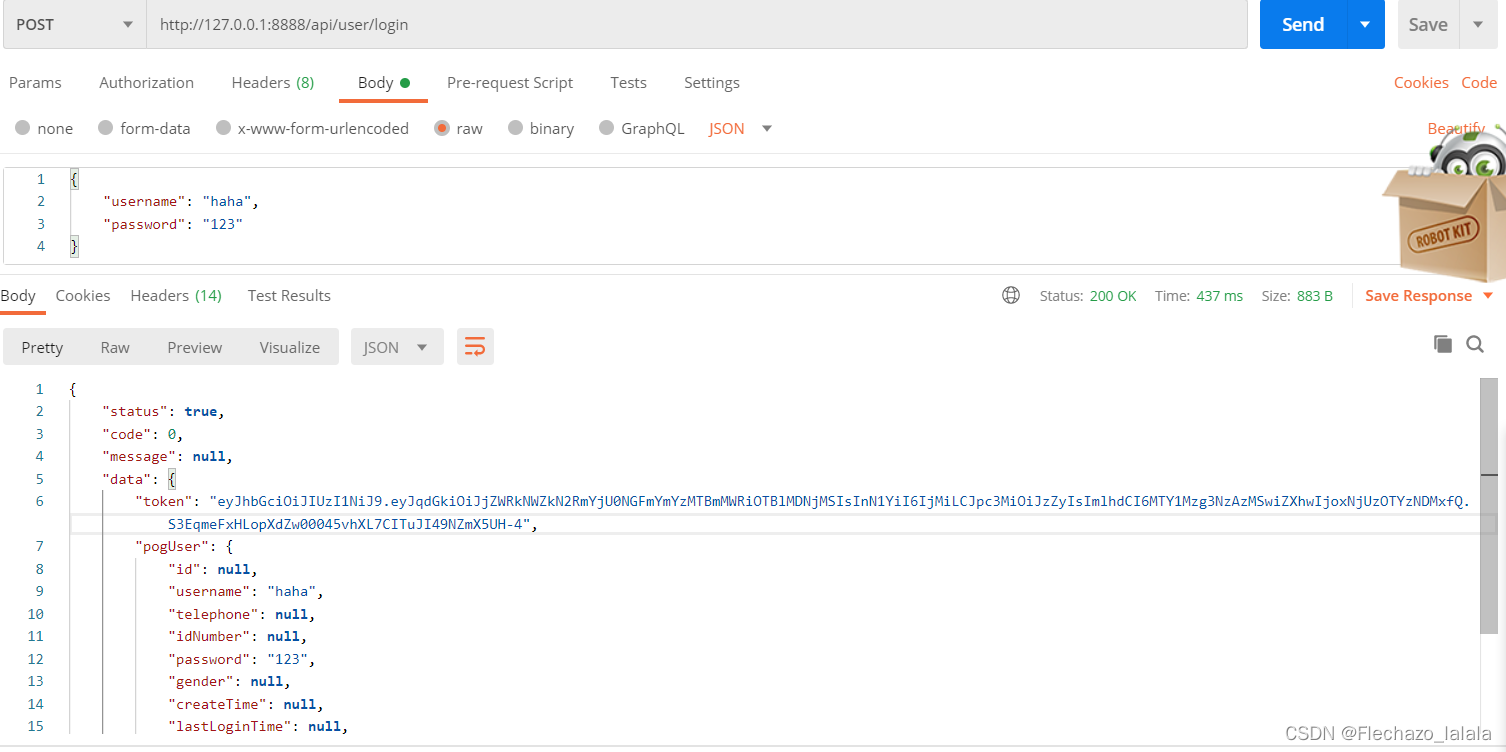
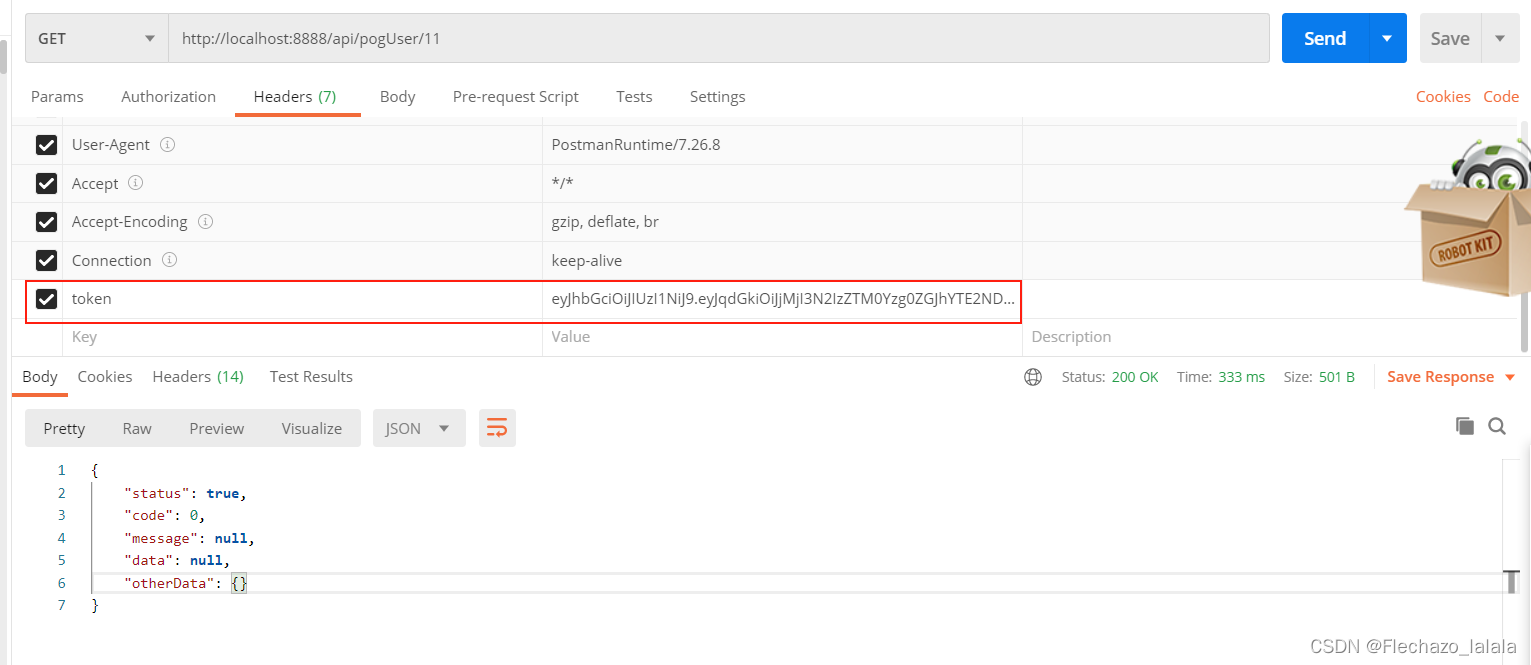
一些踩过的坑
????????一开始我想着为了测试方便,就在拦截器的白名单上加上了 /**, 然后后面我发请求的时候我又带上了token,然后就一直被拦截,我当时想我不是所以路径都不拦截了吗,还一直拦截我, 然后我就把token去掉,欸,不拦截了。?原来是要不在白名单里的路径才要带上token,在白名单里带上token就一直被拦截,当时真的不知道为什么,后面才发现是JwtAuthenticationTokenFilter里面判断的问题,我在原有的基础上加上了token内容判空。

特别说明:
????????本篇文章是跟着哔哩哔哩的up主三更草堂的视频来做的,个人觉得他讲得很通俗易懂,逻辑也很清晰,通过他的视频我才大概了解SpringSecurity整个的工作流程,并能够将SpringSecurity整合到自己的项目中,感恩。